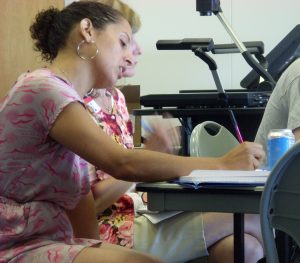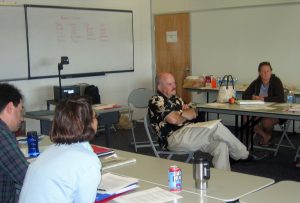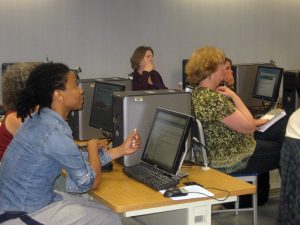
Summer Institute Fellow fellow writing
Program
This fifteen-credit certificate program is designed for K-12 teachers and administrators in all subject areas who want to learn strategies to strengthen students’ writing and thinking skills, develop expertise in teaching writing and literacy across the curriculum, gain a deeper understanding of literacy learning, and improve their own writing. Participants will examine current readings in composition, literacy and writing pedagogy, share successful teaching practices, develop and implement curriculum, and document the effects of their teaching by collecting and analyzing student work.
The Boston Writing Project (BWP) is part of UMass Boston’s Institute for Learning and Teaching (ILT), located in the College of Education and Human Development. An affiliated site of the federally-funded National Writing Project (NWP), the BWP has provided comprehensive instruction in the teaching of writing since 1979. Courses draw on the NWP “teachers teaching teachers” model, which research and assessment have demonstrated to be among the most effective methods for creating authentic, lasting improvements in curriculum, learning, and teaching.
Certificate Requirements
The following three core courses (totaling 9 credits) are required:
BWPEDU 501, Teacher as Writer, in which educators work on crafting their own writing in order to better understand the complexities student writers face.
EDU G 621, Teaching Writing K-12 covers practical classroom applications of composition theory.
EDU G 689, Teacher Research, a course in classroom inquiry, in which teachers reflect on their own practices in a systematic way and draft professional articles.
Participants also select two elective courses (6 additional credits) which may include:
BWPEDU 501, Writing in the Content Areas (Middle and High School)
BWPEDU 530, Teaching and Writing Poetry: K-12
BWPEDU 596, Independent Study
BWPEDU 597, Special Topics
Faculty
Instructors are practicing teachers with a minimum of five years classroom teaching experience, master’s degrees or doctorates and extensive staff development experience. They are teachers and writers whose areas of expertise include composition, special education, early literacy, reading, writing in the content areas, and ELL education. Their common ground is their affiliation with the Boston Writing Project and the shared NWP philosophy of teachers teaching teachers.
Schedule, Location, and Cost
Courses and institutes are offered as intensive two and four-week summer sessions and evening or weekend courses during the fall and spring semesters. They may be held at on or off-campus locations. Some institutes offer stipends or tuition waivers.
Applications and Additional Information
Applicants must be practicing teachers or administrators. A master’s degree is preferred. Pre-service teachers may be admitted to one or more of the courses if space is available.
Applicants may be able to transfer up to six credits from previous BWP courses (completed within the past seven years).
If you are interested in applying to the program, you may apply online through Graduate School Admissions to the Boston Writing Project.* Applications should include a letter of intent declaring your interest in the BWP Graduate Certificate in the Teaching of Literacy and Writing. The application process also requires that all undergraduate and graduate transcripts be submitted as part of your application along with an application fee of $40 for in-state residents and $60 for out-of-state applications.
(*You can also make a Graduate Academic Information Request by following the above link and clicking on request materials be mailed to you and then clicking on graduate information request form .)









